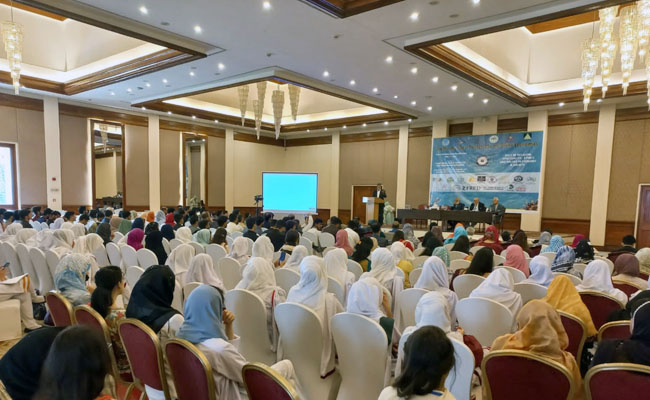MUZAFFARABAD, May 6: The capital city of AJK witnessed a momentous event as renowned intellectuals, economists, and scholars from various corners of the globe convened to engage in insightful discussions on the “Role of Religion, Spirituality, Ethics, and Values in Economy and Society.”
The third International Divine Economics Conference, organized by the Islamic Social Sciences Forum (ISF) of Hadi Foundation in collaboration with esteemed universities and AJK Medical College, commenced with great enthusiasm on Saturday.
The conference aimed at to question traditional economic paradigms and delve into the profound influence of religion, ethics, values, and spirituality on the economy and society. Anticipation ran high as distinguished speakers and participants geared up to challenge established norms and explore novel perspectives on the interplay between economic systems and the realm of faith.
The inaugural session, held at a local hotel on Saturday morning, set the tone for the momentous event. Presided over by the Former Chief Justice of Azad Jammu and Kashmir, Justice Chaudhary Muhammad Ibrahim Zia, the session featured addresses by notable figures such as Prof. Christopher Hodshire from the United States and Dr. Redek Tadeusz E. Biernacki from Chile, who joined remotely. Renowned economist Dr. Faheem Khan, Chairman of the Hadi Foundation, and Conference Chair Prof. Dr. Nisar Hussain Hamdani, along with other distinguished guests, also delivered thought-provoking speeches.
In his address, Former Chief Justice, Justice (R) Chaudhary Muhammad Ibrahim Zia emphasized that Islam encompasses all facets of life, including the economic dimension. He applauded the conference as an excellent opportunity to deliberate on the economic challenges posed by conventional systems and make rational decisions. Justice Zia stressed that isolating the economy from religion, values, and the social fabric would be counterproductive, highlighting the inherent interconnectedness of these elements.
Prof. Dr. Nisar Hussain Hamdani, Chairman of the Hadi Foundation, provided an overview of Divine Economics and shed light on the latest developments in research within this field. He expressed hope that the conference would serve as a unique platform for stimulating discussions and debates on integrating religion, ethics, and values into the economy. Prof. Hamdani envisaged that the conference could challenge conventional wisdom in economics, inspiring economists and social scientists to reimagine the discipline by placing a greater emphasis on the role of religion, ethics, values, and spirituality in shaping economic systems.
The gathering witnessed an enlightening address by Prof. Christopher Hodshire from the United States, who discussed divine economic justice and ongoing collaborations between religious institutions and their impact on poverty at both local and national levels. Prof. Hodshire also highlighted the shortcomings and pitfalls of capitalism and government policies, providing valuable insights for the participants.
The conference comprised several parallel sessions on Saturday, each chaired by esteemed individuals in their respective fields. Dr. Tariq Majeed chaired a session dedicated to the theme of well-being, Corporate Social Responsibility (CSR), and Human Capital, which included engaging discussions on research papers and abstract presentations. Another session, led by Dr. Zafar Siddiqui, explored the subjects of education, human development, and innovation through thought-provoking papers and abstract presentations.
Mufti S. Umer Amad ud Din, a distinguished Sharia Scholar and Internal Sharia Audit Expert at Eman (Silk Islamic Bank), chaired a session focused on Islamic Banking and Economy. Co-chaired by Mr. Moghees Shoukat, this session witnessed stimulating discussions revolving around research papers and abstract presentations pertaining to the theme.
Furthermore, an insightful session, under the guidance of Dr. Attique ur Rehman, Director of the Kashmir Institute of Economics at the University of Azad Jammu and Kashmir (UAJK), delved into the practical applications of Divine Economics. Scholars presented papers and engaged in enlightening talks, contributing to a comprehensive exploration of this crucial aspect.
The concluding session, chaired by Dr. Abdul Rasheed from SOE IIUI and co-chaired by Dr. Zalakat Khan from Peshawar University, revolved around the theme of conventional economics, providing a fitting end to the intellectually stimulating conference.
Eminent scholars and faculty members from various prestigious universities across Pakistan, including Abdul Wali Khan University, Peshawar University, Mardan University, Quaid-e-Azam University Islamabad, Pied University, Bahria University, Air University, International Islamic University, Islamia University Bahawalpur, Punjab University, Karachi University, Fatimah Higher Education System Karachi, and ISRA University Hyderabad, graced the conference with their presence. Heads of departments, faculty members, PhDs, and MPhil scholars from other state universities also joined the event, indicating the widespread interest in exploring new avenues of research in economics and Islamic social sciences.
The conference will draw to a close on Sunday, with participants convening at the Azad Jammu and Kashmir Medical College Auditorium. The concluding ceremony, scheduled for 11:45 AM, will witness the distribution of certificates to all participants, recognizing their valuable contributions to the conference’s success.
